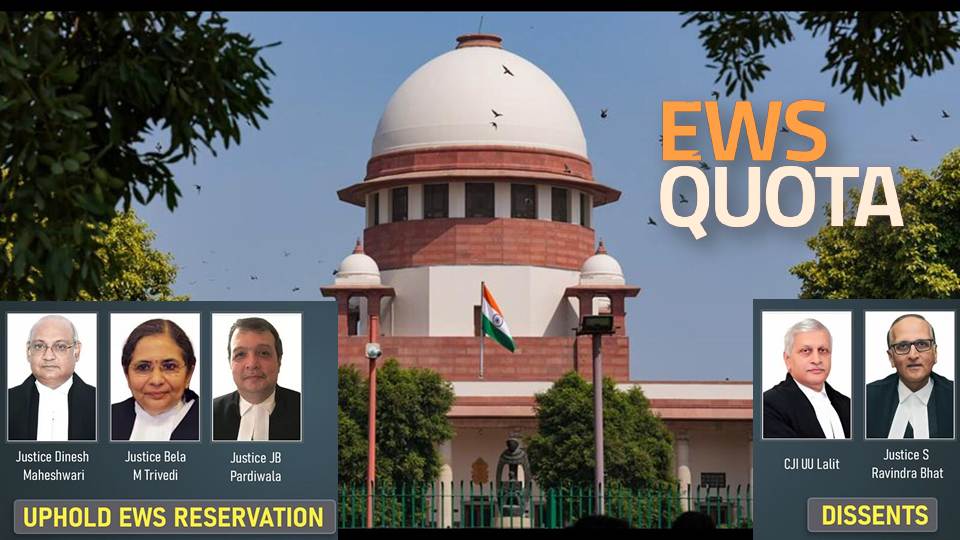Economic Backwardness Reservation: Identity politics is a scourge. It is the manifestation of tribalism in a new form. Judging people based on their immutable characteristics is a moral crime, and even if it is necessary, there should be a limitation to policies like reservation.
But vote-bank politics rarely offers such opportunities. The other way around unfair discrimination is to discriminate against everyone. Reservation for all is one such idea whose time has come.
Economic Backwardness reservation is constitutional
The Honourable Supreme Court has given assent to reservations on the basis of economic backwardness. A five-judge Constitutional Court bench gave the decision with a 3:2 majority in favour of the 103rd Constitutional Amendment.
In a refreshing interpretation of the word equality, Justice Bela M. Trivedi said, “Treating EWS as a separate class would be a reasonable classification. Just as equals as unequals, unequals cannot be treated equally. Treating unequals equally violates equality under the Constitution.” Interestingly, outgoing CJI U. U. Lalit was on the other side of the dice.
Also read: 1932 Domicile Policy, 77% reservation: Soren rings the death knell for himself
Reservation in India
The change was long overdue, and it took more than 100 years to come. Non-Brahmin reservation existed in pre-independence India as well. In 1902, Rajarshi Shahu gave 50 percent of his land to backward communities.
More than a decade later, M. Visvesvaraya, the modern father of engineering in India, opposed such a move in Mysore. Then the British also introduced the idea in various Government of India Acts, the Simon Commission, and round table conferences.
In post-independent India, the caste system was abolished in letter. Articles 14 to 18 were brought specifically for that purpose. However, Article 46 also existed. Through this, the Constitution’s maker asked successive governments to protect the economic interests of scheduled castes, scheduled tribes, and other weaker sections. Clearly, intra-Constitutional confusion was there.
Also read: Fake News Alert: Indian Express claims “caste based reservation” in Agnipath scheme
The Nehru government opened the gates for caste-based discrimination
The Nehru government’s idea to cut through it was introducing the first constitutional amendment act. The act introduced clause 4 in Article 15. It enabled the government to make, “special provision for the advancement of any socially and educationally backward classes of citizens.”
It is pertinent to note here that the change was necessitated after the Supreme Court termed caste-based reservation “ultra-vires” in the Champakam Dorairajan Judgement.
The first amendment opened the floodgates. The introduction of the word “class” in Article 15(4) became the basis for more and more such reservations in the future.
In 1953, the Kaka Kelkar Commission was established to determine the extent of social and educational backwardness to be considered for reservation. It turned out to be infructuous. Meanwhile, the term limit of 10-year term for reservations kept increasing.
Mandal Commission and vote bank politics
The next big change came with the Mandal Commission. It necessitated the introduction of a 27 percent reservation for other backward classes. Soon, reservations for promotions also became legitimate. Reservation turned into a nucleus of vote bank politics. Vote bank politics is the main reason why economic backwardness could not become a reason for providing reservation.
The Honourable Supreme Court did try to provide some bulwark by introducing the 50 percent limit and concept of a “creamy layer.” The judiciary kept demanding more efficiency, but the legislature kept ignoring it, which led to successful extensions of reservation.
Also read: Punjab Congress govt bats for 100% reservation for Punjabis in private and government jobs
Liberalisation has changed things
However, the aftereffects of 1991 liberalisation did change the course a bit. As society started to prefer wealth over existing social classes, it led to demands for a lack of money being classified as criteria for reservation.
The reservation on economic backwardness is in line with the idea of economic justice enumerated in the Preamble. The Honourable Supreme Court has opened the gates for universal reservation. From here on, either the reservation will be abolished or everyone will be under its umbrella.
B. R. Ambedkar had once said, “Equality may be a fiction, but nonetheless one must accept it as a governing principle.” True equality is a utopian concept since every human is born with different abilities and toils differently. If there is affirmative action, it should recognise this basic tenet of human nature.
Support TFI:
Support us to strengthen the ‘Right’ ideology of cultural nationalism by purchasing the best quality garments from TFI-STORE.COM
Also Watch:
https://www.youtube.com/watch?v=kLunOrpB2es
